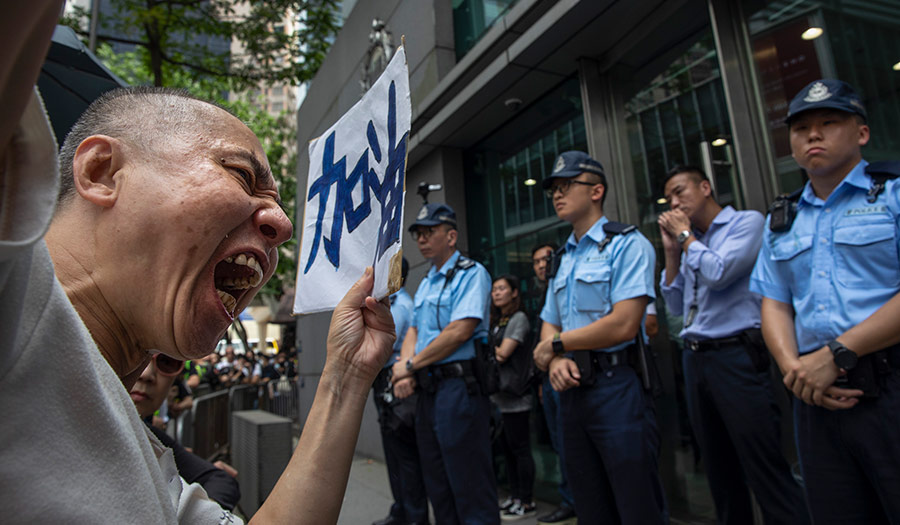 Paula Bronstein/Getty Images
Paula Bronstein/Getty Images
Protesters surround the police headquarters in Hong Kong (June 21, 2019).
From Beirut to Hong Kong, protests reveal global frustration.
Subscribe to the Real Truth for FREE news and analysis.
Subscribe NowDancing orange flames churn thick, putrid, mud-colored smoke in the middle of a once-traffic-congested street in downtown Santiago. It is just one of dozens of car-size fires roiling over piles of debris in Chile’s capital that were set by protesters demanding improvements in health care, public transportation, education and other government-provided services. At a point, 1.2 million people jammed into the city center for a rally.
Santiago is just one of the many places that have caught fire across the globe, both literally and figuratively.
From Beirut to Hong Kong and London to Port-au-Prince, furious demonstrators swept through cities to demand fundamental change. These often-violent protests set tires, government offices, stores and metro stations ablaze.
It was the biggest surge of rallies since the Arab Spring in the early 2010s. Some publications argue that 2019’s protests match the anti-communist demonstrations in Asia and Eastern Europe in the late 1980s and early 1990s in terms of number of countries involved.
Yet while these past waves of unrest took aim at dictatorships, the latest demonstrations are more so rattling elected governments.
For months, pro-democracy activists in Hong Kong poured into streets, going so far as to stage the world’s largest takeover of an international airport and occupying university campuses in weekslong standoffs with police. Though sparked by a proposal from Hong Kong’s government to allow criminals to be extradited to mainland China, the protests turned into a wider call for securing the semi-autonomous city’s freedoms from Beijing.
Lebanon was shaken by its largest demonstrations in decades over systematic corruption and mismanagement that brought the country into dire economic straits, leading the prime minister to resign within weeks.
Anti-government demonstrators in Iraq and Iran faced direct gunfire from security forces, leaving hundreds dead in both nations.
The list goes on: Algeria, Britain, Ecuador, France, Guinea, Haiti, Honduras, India, Kazakhstan, Pakistan and Spain.
What is driving the protests thousands of miles apart, across countries with profoundly different politics, economies, cultures and histories?
“One obvious link is also the most superficial: the role played by social media,” The Guardian reported.
Social media enables the mass spread of notions of injustice. A mob mentality is compounded when it includes millions of people who feel oppressed across continents, not just the streets of one city.
Another motivator in the global trend is “generational,” the British news outlet continued. “The majority of those protesting now are the children of the financial crisis—a generation that has come of age during the strange and febrile years after the collapse of a broken economic and political orthodoxy, and before its replacement has emerged.”
“All this has produced a generation charged with hopelessness and hope.”
But can grassroots movements—often violent—effect the change people seek?
Indeed, many leaders are taking the message and responding. Chile’s President Pinera announced a package of measures including raising pension pay and increasing the minimum wage of $400 a month by 16 percent.
Several others resigned quickly following pressure from citizens: Puerto Rico’s Governor Ricardo Rossello, Bolivian President Evo Morales, and the leaders of Sudan and Algeria. Citizens in some nations settled for the repealing of unpopular legislation.
Yet many of these movements have only continued to fuel the problems and hopelessness they seek to escape.
In Chile, vandals and demonstrators wielding gasoline bombs all but destroyed commerce in many cities. Treasury minister Ignacio Briones has predicted that 300,000 people will lose their jobs because of the damage inflicted to stores. Small business owners say 50,000 already have.
Also, the likelihood government concessions can quell the rebellion is low. In many cases it has emboldened protesters to make more demands. Hong Kong’s activists dug in even after the announcement that the extradition bill that triggered demonstrations would be rescinded. Organizers vowed to continue the fight until other demands were met.
Stop and break down what is going on here. People feel their governments have failed them—yet they are looking to governments and officials to bring solutions. Few, if any, of these protests have clear, actionable solutions to the problems they are calling out. Yet many are frustrated and see no other way to make their voices heard.
Tragically, such protests rarely bring good immediate or long-term results.
Is it any wonder Jesus told followers to pray “Your Kingdom come”? The Kingdom of God is just that: a Kingdom. Today, we would call it a government, something that has the rule of law over citizens.
Realize. We are told to pray that this Kingdom will arrive, which means it is not here yet!
The record of history shows that God’s government is not yet set up on Earth. The world is shot through with bureaucracy, corruption, mismanagement, cronyism and the like.
The Bible reveals that government solutions cannot come from the hands of men. Instead, it can only come from “the God of heaven,” who Daniel 2 states will “set up a kingdom, which shall never be destroyed: and the kingdom shall not be left to other people, but it shall…stand forever” (vs. 44).
Only a Kingdom led by God Himself can permanently benefit citizens living under it. Only this perfect government can end mankind’s millennia-old woes of war, poverty, famine, disease, crime and so forth.
Notice Isaiah 9: “Of the increase of His government and peace there shall be no end…” (vs. 7).
The unending pleas from millions of people reveal all peoples’ genuine need for this world-ruling supergovernment. It will soon bring true justice to the troubles both citizens and governments face.
To anyone wanting to see past the confusion and unrest that defines the world today, read What Is the Kingdom of God?